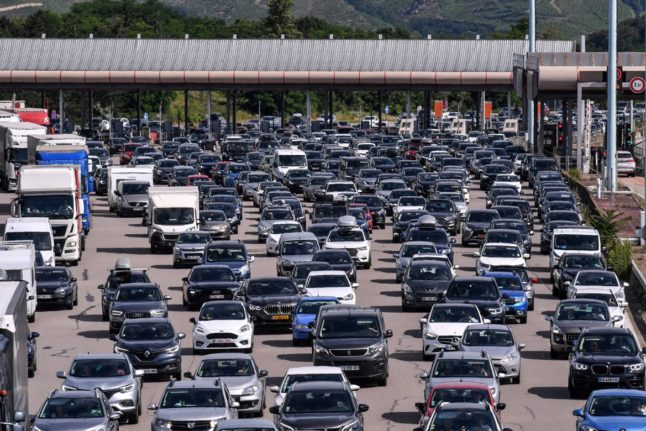Europe will reopen its external borders on July 1st but American tourists may not be allowed to travel because the US is still considered a risk due to the high number of Covid-19 cases.
Hard-hit countries such as Brazil, Mexico, Russia and India are also facing a continued travel ban.
EU officials are reportedly frantically drawing up a list of countries whose nationals will be allowed to travel to the EU, when borders reopen on July 1st as well as a list of countries where restrictions will remain in place.
While the final lists have not been published or even set in stone, the New York Times reports that it has seen two draft versions with the US placed on the banned lists.
However one EU diplomat told Reuters news agency: “There's no list (of countries), just a list of criteria.”
The EU is expected to announce the final lists in the run up to July 1st. The lists will then be reviewed “on a regular basis” and countries can be added or withdrawn depending on how active the virus is.
The EU has stated that countries should only be given the green light if their infection rates are the same or better than the EU average.
If they are considered worse, then people travelling from those countries will not be allowed entry.
According to the New York Times, the average number of new infections in the EU over the last two weeks stands at 16 per 100,000 people, whereas in the US the figure is 107. Brazil's is even higher at 190 and Russia's is 80.
'Restrictions should remain in place for countries worse off than the EU'
The US has reported more than 2.3 million coronavirus cases and 120,000 deaths related to the disease – more than any other country.
However nationals from countries like New Zealand and Australia will almost certainly be allowed to travel to the EU again after July 1st given the low infection rates in those countries and the success they have had in controlling the outbreak.
EU sources have told the media that it would be hard to make a case for allowing Americans to travel to Europe given the difference in the rate of infections.
To make matters worse several US states have seen a surge in new infections and hospital admissions in recent days.
“Restrictions should be lifted first with countries whose epidemiological situation is similar to the EU average and where sufficient capabilities to deal with the virus are in place. Restrictions should remain in place for countries whose situation is worse than in the EU,” read a guidance document from EU Commission published last week.
The Commission advises other data and information also be taken into account when choosing which countries will be allowed to resume travel such the systems in place to prevent the spread of the virus such as testing and tracing. EU decision makers should also look at whether airports will comply with safety guidelines.
The EU should also look at trends of infections and will take the reliability of data into account when deciding whether or not to permit nationals from a certain country.
These are however only proposals from the Commission – the final decisions will ultimately to be made by each member state.
At least 12 million Americans visit Europe each year
It is likely economic factors will also be taken into account, including the value to the EU economy of American tourists, when drawing up the final versions of the list.
In 2016, some 12 million Americans travelled to Europe with Italy, France, Germany and Spain among the most popular destinations.
Countries like France and Germany have along with the Commission stressed the need for a “common and coordinated approach” and don't want individual states going it alone.
The Commission has also made it clear the continued restrictions after July 1st wouldn't apply to EU nationals, those from Schengen area countries (Switzerland, Norway, Iceland) or non-EU nationals and family members who have their main residence in Europe “regardless of whether or not they are returning home”.
“Member States should ensure that those travelling to study are exempted, together with highly skilled non-EU workers if their employment is necessary from an economic perspective and the work cannot be postponed or performed abroad,” the EU Commission states.
EU states are set to continue discussing the criteria on Wednesday.



 Please whitelist us to continue reading.
Please whitelist us to continue reading.
The USA is a large country and some regions/States have acted responsibly during the pandemic, self-isolating and mandating masks. Just like Italy, there are regions that are not experiencing drastically higher infections from COVID-19. It’s true that several States, generally with Republican leadership that has been following Trump’s direction, that opened too early and are in trouble with their infection rates. However, I think that the USA States’ citizens should be allowed some leeway to travel to Europe. For example, if they are not classic “tourists” but have a place to quarantine for the required period of time. I, for example, have an apartment for which I have a 4 year contract in Italy. I can’t get to it. I understand the lack of respect that has been shown the European nations in the form of Trump and his policy-makers, but there are many other citizens of the USA who have actedd more responsibily. I would hope the EU takes this into consideration. Perhaps requiring a minimum stay with a verified private (not hotel) address where quarantine can be accomplished, along with verified support for groceries, etc. – and then allow for these exceptions. I hope we can once again – in a safer, healthy and mutually considerate way – visit our European neighbors again.
This Australian family was due to travel to Italy next Friday to visit our Italian family, but even if Italy allows this it won’t happen because our borders are closed to all international travel. We are feeling so sad not be there for the Italian summer, but also feeling lucky to live in a part of the world that has stayed relatively safe. Next (Italian) summer, we hope.
Go ahead EU ban Americans, perhaps the Chinese tourist will make up for the billions US tourists spend, and while they are at it, maybe bring another virus to your shores! In 2018 US tourist spent over 5 BILLION US dollars which includes business and personal travel, plus in-country spending.
@Luigi- Trump, is that you?
Sure, Luigi, let’s allow Americans to bring the virus back to Europe with their high numbers instead of the Chinese. Sounds like a good idea. I am an American living in France and I will be glad if they go through with this ban, or at least put restrictions in place for those that have property in Europe as a commenter mentioned above,
As for Mariuccia2019, please get your facts straight! A vast majority of the deaths in the US were in DEMOCRATICALLY controlled states, most of whom ignored the CDC guidelines as reported this week by a CDC representative. New York Governor Andrew Cuomo [as well as PA, IL, and others] had forced nursing homes to take in COVID patients. As much as the media and left would like to blame everything on Trump, the reality is there was NO right way to deal with this pandemic.
Of course there was a right way. The Trump administration’s reduction of pandemic response forces at the federal level clearly didn’t help.
Second wave COVID is on the rise in red states because of premature reopenings and general disregard for the pandemic.
Luigi, the vast majority of the deaths were in blue states because that’s where most of the people live. You get your facts straight. Now, the second wave is in mostly red states because their idiotic Governors will not institute controls, and residents in red states have a self-control of a Tasmanian devil.
We have not been able to visit our 2nd home in the Dordogne since Sept. 2019. The French strikes killed our Dec. trip and then the May trip due to COVID. I can certainly understand the concern for France as cases are up here in the US. However, the US is a very large country and not all areas are having the issues. For those with 2nd homes why not look at where they live in the US for potential exposure and then if in a low area of risk require a 14 day quarantine in their homes in France. We could at least do maintenance on our homes and one of our friends in the village could bring us food and supplies, and wine! Just a thought. Merci
The PLANDEMIC was a test. Perhaps the powers that be don’t want it to end.
Unfounded conspiracy theories lessen yourself and everyone you talk to.
I’m all for banning us (Americans). I hope lots of people are royally pissed out about, and take your anger to the voting booth and get rid of the moron we have for a president and the moron Republican puppet senators!